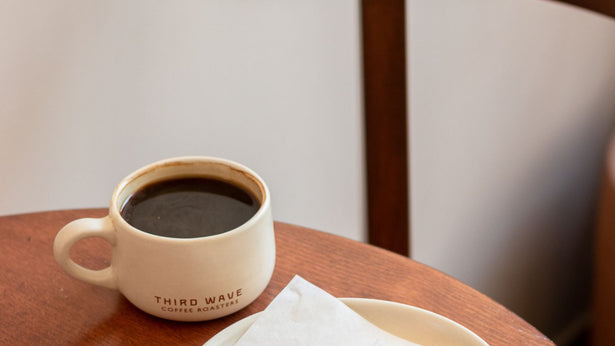Turks are passionately devoted to their beloved Turkish coffee, and it is deeply rooted in their culture. The term "kahvalti" ("breakfast") itself implies that they start the day by drinking a cup of this energizing beverage - so much so that another word for the colour brown, “kahverengi” means ‘coffee coloured!’
Cascading down through the generations, Turkish coffee is undoubtedly steeped in history and tradition. As a result of its unique preparation and presentation methods, Unesco officially declared it part of their Intangible Culture Heritage List in 2013 - proving that there's far more to this morning drink than meets the eye!
What is Turkish coffee?
Turkish coffee is made from the Arabica bean, but there's more to it than that. The traditional method of preparing Turkish coffee is what truly brings out its unique flavour and essence. To create this delectable drink, one must first grind the beans into a fine powder using either a pestle and mortar or ideally - in order to capture its full taste - with a Turkish-style grinder.
Next, the coffee beans are placed in a 'cezve' copper pot filled with cold filtered water. If you'd like to add some sweetness, now is the time! Sugar must not be added later on as it can disrupt the grounds at the bottom of your cup and ruin your Turkish Coffee experience.
After the pot is properly prepared, it should be set to medium heat until a foamy layer of liquid forms. Once this occurs, take the pot off and stir for full effect. Place back onto heat one more time and repeat as needed, making sure that your Turkish coffee has reached its desired thickness before removing it from the stovetop entirely.
After the freshly brewed beverage has steeped, it will be left to settle for a moment; this allows the grounds to sink and gather at the bottom of the pot.
For centuries, Turkey and India have each had a beloved beverage that has made its way around the world. While Turkish coffee is celebrated in Turkey, filter coffee reigns supreme in southern India. If you're looking for an authentic experience of South Indian flavour then look no further than Signature South Indian Filter Blend by the best coffee brand in India!
Turkish Coffee: Culture Of Serving
Instead of drinking Turkish coffee as you would an espresso, it's best to indulge in its flavour and aroma by sipping slowly with friends. Traditionally served in demitasse cups, this beverage is meant for relishing the moment rather than gulping down the grounds that come along with it! In fact, conversing over small doses of Turkish coffee customarily takes up an entire hour; hence making it not just a drink but also a cultural experience.
Enjoying Turkish coffee isn't typically complete without a complimentary glass of water and perhaps even some delectable Turkish delight. This pairing helps to balance the strong and intense flavour of this captivating beverage.
History of Turkish Coffee
Since its introduction to Istanbul in 1555 by Syrian traders, Turkish coffee has been a fixture of Ottoman Court ceremonies for centuries. By the mid-17th century, it had become so popular that even sultans would be served ceremonious cups of the rich beverage - brewed and presented only by their own personal coffee makers.
Ancient Turkish practices connected to coffee still linger today—specifically when it comes to marriage. It's said that a woman must prove her worthiness as a potential bride by brewing Turkish coffee correctly in front of the family and suitor. If she makes an excellent cup, then people consider that she is ready for marriage. This custom has quite literally stood the test of time, proving how essential this beverage continues to be for social occasions and romantic circumstances alike.
Around 500 years ago, coffeehouses started emerging in Turkey's Tahtakale neighbourhood - and they quickly became a popular gathering place for men. Women, on the other hand, typically consumed the beverage within their homes. During the Ottoman Empire era, these cafes additionally acted as settings where stories and folklore were passed down through generations - becoming an integral part of preserving Turkey’s oral history!
If the ancient history of Turkish coffee has stirred your interest, why not take an even deeper dive into the captivating history of coffee in India?
Turkish Coffee: Types
For centuries, Turkish coffee has been brewed in the same manner - using a 'cezve'. Yet it can be enjoyed with some minor changes too. The most popular variations of this tantalising beverage include
Menengiç Coffee
If you're seeking a unique and flavorful beverage, try Menengiç coffee. This alternative to traditional coffee isn't made from beans but rather the Pistacia terebinthus tree seeds. Unlike regular coffees, this exotic drink contains no caffeine and instead offers an intriguing fruity taste that many aficionados love! Furthermore, it is prepared in the classic Turkish style for your enjoyment.
Dibek Coffee
Dibek coffee is a much lighter version of Turkish coffee, both in taste and colour. It's also made by grinding the beans with a stone pestle and mortar, thus earning its name 'stone ground'. Those who prefer something less intense are sure to enjoy this creamy beverage that's thicker than other varieties.
Mirra
Mirra derives from the word ‘bitter’, aptly describing its robust and intense flavour. These beans undergo double roasting, resulting in a coarse grind that adds to their bitterness; thus cardamom and other spices are often included to create an all-encompassing taste.
Whether cooked on sand, coals, or ashes - Turkish coffee has a unique and distinct taste all its own. The most traditional method is done over hot sand beneath the open flame of a stovetop; making it an ideal drink to enjoy at home with family and friends! This concludes our guide to exploring the culture-rich history that surrounds this beloved beverage.

